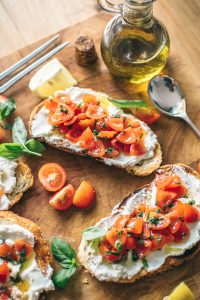 I get a lot of questions from clients in Florida and other areas about the effect of diet on inflammation. There is a connection and there’s even a new branch of the medical field studying the effects of food on illness or rather, focusing on food for health. Inflammation isn’t bad. It’s a natural process that’s necessary to keep people from dying from infection and injury. Inflammation sends a message to the immune system to come to the rescue when tissue is damaged or subject to invasion by viruses, bacteria or other foreign microbes. Without inflammation, people could die from small wounds that easily would become infected.
I get a lot of questions from clients in Florida and other areas about the effect of diet on inflammation. There is a connection and there’s even a new branch of the medical field studying the effects of food on illness or rather, focusing on food for health. Inflammation isn’t bad. It’s a natural process that’s necessary to keep people from dying from infection and injury. Inflammation sends a message to the immune system to come to the rescue when tissue is damaged or subject to invasion by viruses, bacteria or other foreign microbes. Without inflammation, people could die from small wounds that easily would become infected.
Sometimes things go amok.
You can have too much of a good thing when it comes to any of the body processes. Your body is all about balance. There are a number of reasons the inflammation response can get out of control with chronic chemical signals in the body. It can occur from environmental reasons, diet and lifestyle. Chronic inflammation is where the problem begins and it can end up with a stroke, heart disease, autoimmune disorders or other serious conditions. It’s even linked to Alzheimer’s disease.
A healthy diet is one way to help reduce the potential for inflammation.
Even though there’s a focus on food as medicine that’s gaining ground, there’s still not enough information to exchange modern medical treatments for food. However, consuming an anti-inflammatory diet can help reduce signs and symptoms of inflammation, lower the potential for a disease that comes from inflammation and improve the quality of life. Anti-inflammatory foods include everything from consuming a Mediterranean diet to eating whole foods and plant based proteins.
It’s a rainbow of colors that help fight inflammation.
Plants have phytonutrients whose effect on the body still isn’t clearly understood. Some of these, like anthocyanin, give the plant their color. These pigment producing phytochemicals are actually potent inflammation fighters. It only makes sense that eating colorful fruits and vegetables like blueberries, cherries and blackberries would be anti-inflammatory. Vitamin K also has anti-inflammatory properties, so choosing leafy green veggies like spinach and kale can reduce inflammation.
- Choosing food with omega-3 fatty acids are anti-inflammatory. Fatty fish like salmon, nuts and seeds and vegetable oils like flaxseed oil all contain omega-3 fatty acids.
- Tomatoes are anti-inflammatory and so is olive oil. Those two foods and high amounts of vegetables may account for the Mediterranean diet noted for its anti-inflammatory properties.
- What you shouldn’t eat is just as important as what you should eat. It’s no surprise that fried foods, refined carbs, soft drinks, processed meat, margarine and foods high in processed sugar cause inflammation.
- Eating too few anti-inflammatory foods and too many foods that cause inflammation may lead to low grade chronic inflammation, which can ultimately lead to health conditions like allergies, cancer, diabetes and heart disease.
